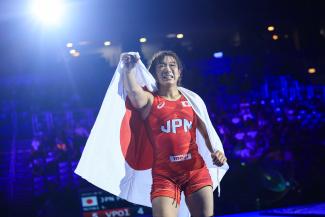After tears, Yanan Sun wants to come back with a smile
Wednesday, April 26, 2023 - 06:09 By

-- by Xinhua sportswriters Wang Chujie, Huang Haoran
NANCHANG, South China (April 26) -- Tears streamed down Yanan SUN's (CHN) face as she knelt in the center of the mat. It was August 7, 2021, and the women's freestyle wrestling 50kg final at the Tokyo Olympics had just ended. In less than two minutes, Sun had lost the match due to a small mistake that cost her dearly.
When asked by reporters if she would continue to train for the next Olympics after the match, she couldn't give a definitive answer. At the time, she faced many challenges, including injuries, age, and younger competitors vying for her spot.
In early spring 2023, Sun returned to China's national women's wrestling team after nearly a year of recovery from knee surgery.
"When I make up my mind, all the difficulties or challenges seem to be no problem."
The Rio Olympic bronze medalist and Tokyo Olympic silver medalist has embarked on her journey to prepare for the Olympics once again.
To better prepare for the upcoming Asian Championships, the Chinese team relocated in mid-March to train in Nanchang, where the national youth team also trained at the same time.
Perhaps seeing the youthful faces, Sun thought of her own inexperienced self. She, who hasn't updated her personal social media for a long time, posted a photo of herself participating in the Asian Youth Wrestling Championships in 2010 with the caption, "Enjoying time with passion makes time more meaningful."
"This is the first international competition I participated in," Sun said. "Seeing this photo and recalling the scene from back then, although it has been 13 years, the passion in my heart for wrestling has never changed."
She shared this photo to encourage herself to leave behind everything from before and start anew.
 Yanan SUN (CHN) is a bronze medalist from the Rio Olympics as well. (Photo: (Xinhua)
Yanan SUN (CHN) is a bronze medalist from the Rio Olympics as well. (Photo: (Xinhua)
Last May, Sun underwent surgery for a bilateral anterior cruciate ligament and has been absent from various international competitions for nearly a year before her return to the national team.
She, however, is only able to undergo physical rehabilitation training. It will take some time before she can resume normal mat-specific technique training and return to matches.
"Rehabilitation training is quite painful," Sun said. "It's about repeatedly stimulating it [the knee], and the mat-specific technique training is not systematic, which can cause some anxiety."
She admitted that she is facing significant challenges but said optimistically that, once she makes up her mind, she will stick to it.
"Yanan is now fully committed to rehabilitation, and it's an exciting challenge to help her recover as soon as possible," said Frenchman Guillaume Defois, fitness coach of the Chinese national wrestling team. "I am in full confidence in her own capacity."
The support of her family also fuels Sun's perseverance.
During the days of being away from the wrestling arena, Sun had her wedding, and her husband Ridong ZHANG is also an accomplished Chinese wrestler.
Most of the wife and husband's conversations revolve around wrestling, and they both understand the meaning of persistence for a dream.
"He is a Greco-Roman wrestler, and I am a freestyle wrestler," she said. "Our events have similarities and differences. We often have intense discussions analyzing opponents or during training breaks.
"My husband is very supportive of me. I also want to seize the opportunity to continue pursuing my dreams. Although it is my own goal, it cannot be achieved without the support of my family and the team."
 Yanan SUND (CHN) and Yui SUSAKI (JPN) compete during the 50kg final at Tokyo 2020 Olympic Games. (Photo: Xinhua / Xu Zijian)
Yanan SUND (CHN) and Yui SUSAKI (JPN) compete during the 50kg final at Tokyo 2020 Olympic Games. (Photo: Xinhua / Xu Zijian)
When asked about her international rivals, Sun said that wrestling is a traditional strength of Japan and Japanese wrestlers often start at a younger age which helps them better understand the sport.
"We also have our own advantages in overall physical fitness and absolute strength, and we must have confidence in ourselves," Sun added.
In 2024, the 31-year-old Sun will strive to step onto the Olympic stage for the third time.
"When I debuted at Olympic Games at Rio 2016, I was a bit naive and forgot to celebrate after I won the bronze medal," she said. "And in Tokyo, though I improved to win a silver, I couldn't help shedding tears of disappointment.
"If I have the chance to continue chasing my dreams in Paris, I hope to leave the Olympic stage with a smile on my face," Sun said.
(Note: This article was orginally published by Xinhua News Agency. It can be read here)



Share your thoughts.
Comments